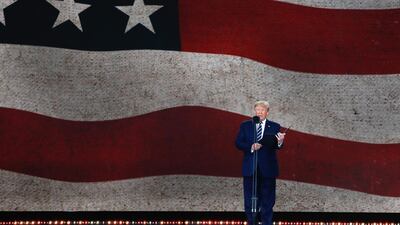When US President Donald Trump unilaterally imposed increased tariffs on Chinese goods, nearly one year ago, many of his supporters saw the move as an effort to boost the American economy and put an end to unfair trade practices. Since then, matters have escalated rapidly, and the two world superpowers have been locked in an ongoing trade war. Part of the problem relates to the Chinese tech giant Huawei, which the US claims cannot be trusted to oversee the implementation of a new 5G network for security reasons. While it is important that these concerns are addressed properly, escalating tensions between the two countries have benefited no one.
In fact, the Organisation for Economic Co-operation and Development has found that, if things continue as they are, the dispute will cost the world economy almost $600 billion by 2021. Furthermore, US companies are suffering because of the row. For instance, Apple's stock fell by nearly 7 per cent last May, almost immediately after Mr Trump declared he would increase tariffs on China.
Not only does a decrease in free trade threaten the livelihoods of people in both countries, protectionism also bears considerable political risks for the US. In recent weeks, Mr Trump has turned on neighbouring countries. Washington has threatened to impose higher tariffs on Mexico, if it does not take further action to prevent migrants from crossing the border into the US. Similarly, the Trump administration has decided to end the Cuban detente initiated by Barack Obama, banning cruise ships and recreational vessels from operating between the two countries. Experts believe that this will have disastrous effects on Cuba's tourism-based economy. It is also likely to bolster the nation's support for Venezuela's controversial president Nicolas Maduro, who is no longer recognised by the US. On Friday, America also removed India's preferential trade status, which had allowed some goods from the country to enter the US free of duty. New Delhi has yet to retaliate, but none of this augurs well for future economic relations.
Many of these countries, with which the Trump administration could have cultivated close ties, are shifting their focus away from the US. Today, China’s President Xi Jinping met with his Russian counterpart Vladimir Putin in Moscow. Against a backdrop of growing US animosity, their talks were focused on making new trade deals and investment pledges. Instead of creating new partnerships, the US is only succeeding in bringing its rivals closer together and alienating those nearby. True to his promises, Mr Trump’s “America first” approach has, indeed, built walls – just not the kind he initially planned on. Instead, he has isolated his country from potential allies and damaged the global economy. Tariffs and tough economic measures may be popular with Mr Trump’s voter base, but in the long run, a trade war will be detrimental to us all.

